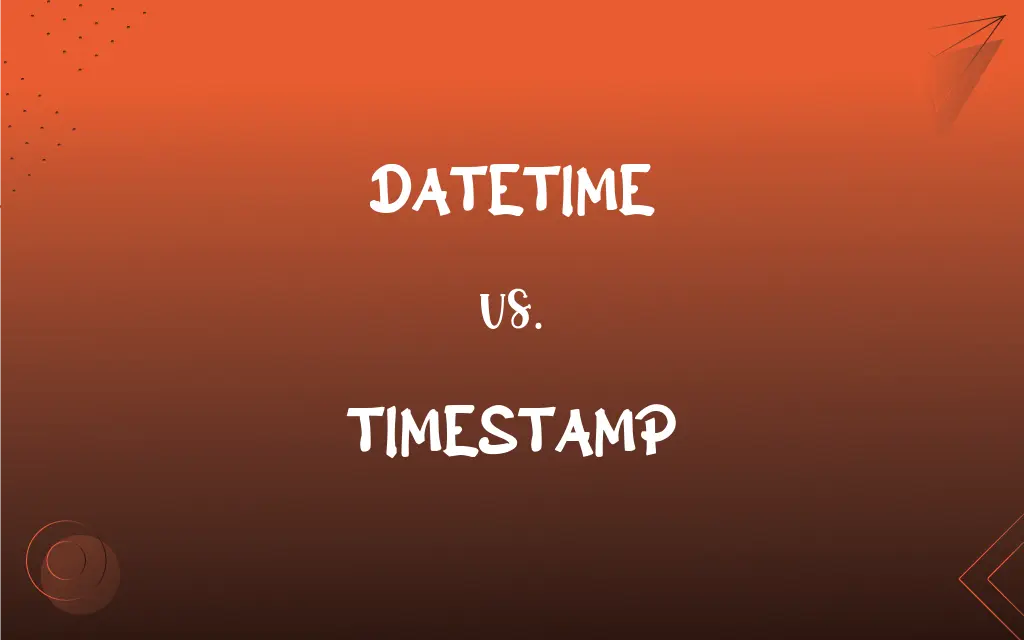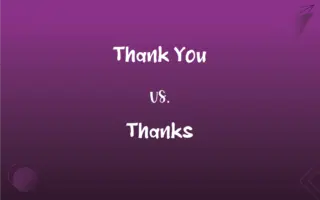DATETIME vs. TIMESTAMP: What's the Difference?
Edited by Aimie Carlson || By Harlon Moss || Published on February 27, 2024
DATETIME represents a date and time without timezone awareness, while TIMESTAMP has timezone awareness and is used for tracking changes in a database.

Key Differences
DATETIME in SQL databases is a data type that stores date and time information without regard to time zone. It is often used for storing birthdates or other events that are not timezone sensitive. TIMESTAMP, on the other hand, is also a date and time data type but includes timezone awareness, making it suitable for recording events in a database with the exact time they occurred, factoring in the server's time zone.
The DATETIME data type can store dates from the year 1000 to 9999, providing a wide range for storing historical or futuristic dates. This range makes it ideal for applications that require a broad span of dates. TIMESTAMP has a narrower range, typically from 1970 to sometime near 2038 in standard SQL databases. This range is because it counts seconds from the Unix epoch (1 January 1970), making it more suitable for timestamps of contemporary events.
In terms of storage, DATETIME values typically require more storage space, usually 8 bytes, because they store both date and time but without timezone data. TIMESTAMP values, despite containing timezone information, generally require less storage, around 4 bytes, since they are stored as the number of seconds since the Unix epoch.
When it comes to usage, DATETIME does not change if the database server's time zone setting changes. It remains constant. This characteristic is essential for data like birthdates, which should not shift with time zone differences. TIMESTAMP, however, automatically adjusts to the current time zone of the database server, making it dynamic and sensitive to changes in the server's time settings.
DATETIME is best used when the exact time of an event is not affected by the timezone of the server, like publishing dates of articles. In contrast, TIMESTAMP is ideal for recording the precise moment an event occurs, such as the exact time a user makes a transaction, which can change based on the server's timezone.
ADVERTISEMENT
Comparison Chart
Timezone Awareness
No timezone awareness.
Includes timezone awareness.
Range
Wide range (1000-9999).
Limited range (1970-2038 typically).
Storage Space
Requires more storage (8 bytes).
Requires less storage (4 bytes).
Behavior with Timezone Change
Remains constant.
Adjusts to the server's time zone.
Typical Use Cases
Birthdates, historical dates.
Record of events, transaction times.
ADVERTISEMENT
DATETIME and TIMESTAMP Definitions
DATETIME
DATETIME is a SQL data type for storing dates and times.
SELECT * FROM events WHERE event_date = '2024-01-23 10:00:00';
TIMESTAMP
TIMESTAMP adjusts to the timezone of the database server.
INSERT INTO transactions (time_stamp) VALUES (NOW());
DATETIME
DATETIME requires 8 bytes of storage in a database.
ALTER TABLE appointments ADD COLUMN start_datetime DATETIME NOT NULL;
TIMESTAMP
TIMESTAMP typically ranges from 1970 to 2038.
UPDATE sessions SET logout_timestamp = '2024-01-23 23:59:59' WHERE user_id = 123;
DATETIME
DATETIME does not consider timezone differences.
INSERT INTO users (birthdate) VALUES ('1990-05-15 00:00:00');
TIMESTAMP
TIMESTAMP uses 4 bytes of storage in a database.
ALTER TABLE user_actions ADD COLUMN action_timestamp TIMESTAMP DEFAULT CURRENT_TIMESTAMP;
DATETIME
DATETIME can store a wide range of dates, from 1000 to 9999.
UPDATE historical_events SET event_datetime = '1066-10-14 09:00:00' WHERE id = 1;
TIMESTAMP
TIMESTAMP is a SQL data type for storing dates and times with timezone awareness.
SELECT * FROM logs WHERE event_timestamp = CURRENT_TIMESTAMP;
DATETIME
DATETIME is ideal for dates that are constant regardless of location.
SELECT title FROM meetings WHERE meeting_datetime = '2024-01-23 09:30:00';
TIMESTAMP
TIMESTAMP is used for recording events in real time.
SELECT user_id FROM access_logs WHERE access_timestamp > '2024-01-23 00:00:00';
DATETIME
(programming) A variable or data type that can hold both date and time components.
TIMESTAMP
(computing) A variable containing the date and time at which an event occurred, often included in a log to track the sequence of events.
TIMESTAMP
To record the date and time of (an event, etc).
FAQs
What is a TIMESTAMP in SQL?
TIMESTAMP is a data type for storing both date and time with timezone awareness.
How much storage does a DATETIME require?
DATETIME typically requires 8 bytes of storage.
How much storage does a TIMESTAMP require?
TIMESTAMP typically requires 4 bytes of storage.
Does DATETIME change with the server's timezone?
No, DATETIME values do not change with the server's timezone.
What is a DATETIME in SQL?
DATETIME is a data type for storing both date and time without timezone information.
When should I use DATETIME?
Use DATETIME for dates that don’t need timezone conversion, like birthdates.
Does TIMESTAMP change with the server's timezone?
Yes, TIMESTAMP values adjust to the server's timezone.
What is the range of TIMESTAMP?
TIMESTAMP typically ranges from 1970 to 2038.
Can DATETIME have default values?
Yes, DATETIME can have default values, but they are not timezone-aware.
Can I use both DATETIME and TIMESTAMP in the same table?
Yes, both can be used in the same table for different purposes.
Does TIMESTAMP include microseconds?
Yes, some SQL databases allow TIMESTAMP to include microseconds.
What is the range of DATETIME?
DATETIME can range from the year 1000 to 9999.
When should I use TIMESTAMP?
Use TIMESTAMP for recording events where the exact time is important, like log entries.
Does DATETIME include seconds?
Yes, DATETIME includes seconds in its format.
Can TIMESTAMP have default values?
Yes, TIMESTAMP can have default values like CURRENT_TIMESTAMP.
Is DATETIME affected by Daylight Saving Time?
No, DATETIME is not affected by Daylight Saving Time changes.
Is TIMESTAMP affected by Daylight Saving Time?
Yes, TIMESTAMP can be affected by Daylight Saving Time if the server's timezone observes it.
Can I store historical dates in DATETIME?
Yes, DATETIME can store a wide range of historical dates.
Is TIMESTAMP suitable for historical dates?
TIMESTAMP is less suitable for distant historical dates due to its range limitations.
How do I convert TIMESTAMP to DATETIME?
Conversion can be done using SQL functions, taking into account timezone differences.
About Author
Written by
Harlon MossHarlon is a seasoned quality moderator and accomplished content writer for Difference Wiki. An alumnus of the prestigious University of California, he earned his degree in Computer Science. Leveraging his academic background, Harlon brings a meticulous and informed perspective to his work, ensuring content accuracy and excellence.
Edited by
Aimie CarlsonAimie Carlson, holding a master's degree in English literature, is a fervent English language enthusiast. She lends her writing talents to Difference Wiki, a prominent website that specializes in comparisons, offering readers insightful analyses that both captivate and inform.
































































